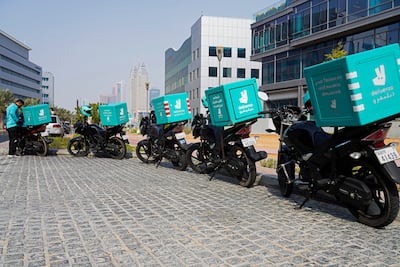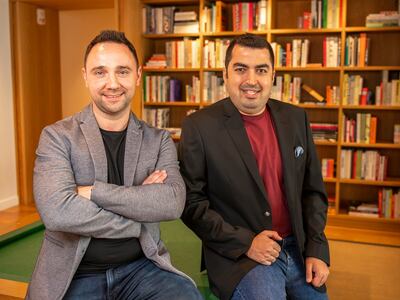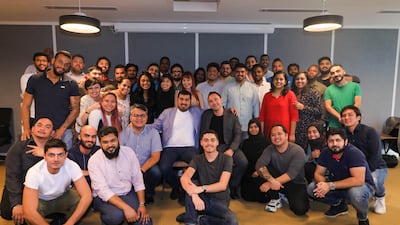In the cut-throat world of the food service industry, where competition is stiff and profits can be razor-thin, a less-is-more strategy can be a means of survival: companies bank on discounts and special offers to gobble up as many orders as possible to boost their bottom lines.
However, George Karam, co-founder and chief executive of The Cloud, a food technology start-up based in Abu Dhabi’s Hub71, doesn’t necessarily believe in that philosophy.
Instead, he believes in the power of the brand: if you think you’re good enough, then dish out your food with confidence knowing that it is value for a hungry consumer's money.
“Unfortunately, some markets have more of a discount culture than others. This is driven by many factors,” Mr Karam tells The National.
“We operate in many markets where discounts are very rare. We power many high-quality brands, which do not need steep discounts to sell.”
The Cloud's strategy is simple: on-board food businesses to a robust ecosystem featuring fellow companies and consumers that connect to each other, opening “instant" access to new pools of customers — with zero upfront investment.
The company is one of only four start-ups that focus on FoodTech at Hub71, the UAE capital's global technology ecosystem.
co-founder and chief executive of The Cloud
Like many entrepreneurs, experience led Mr Karam to conceive The Cloud so others do not go through similar hardships.
“I had a passion for food and opened a bricks and mortar restaurant along with two partners. We struggled a lot because of the high initial investment required and high capital expenditure,” says Mr Karam, who co-founded The Cloud with Kamil Rogalinski.
“This led me to realise that there must be a better way and, in 2018, I launched my first virtual brand."
The Cloud helps restaurant owners maximise their operations by transforming them into cloud kitchens, hence the name.
The Cloud “empowers underutilised kitchens across the UAE … increasing order numbers through the latest technology, online marketing and creative approach,” Mr Karam says.
More importantly, it helps save jobs — and, in the process, keeps salaries steady — by making the most of resources.
Cloud or virtual kitchens — also known as ghost or dark kitchens — are commercial spaces built to prepare food only for delivery, with a number of brands able to operate from that centralised premises.
These “restaurants that do not exist” significantly benefited from the shift to online services during the Covid-19 pandemic, which forced people to rely on apps and delivery services for food.
Brands are able to take advantage of offering flexible menus, more efficient operations and experimenting with new ideas that can easily be scrapped if they don't work, according to US software company Oracle. More importantly, brand owners don’t need materials traditionally found in physical stores such as signage, furniture and decor.
The global cloud kitchen market was valued at $63 billion in 2021 and is expected to reach about $374bn by 2030 at an annual compound rate of about 22 per cent, according to Acumen Research and Consulting.
Food companies accept orders through mobile applications that are then delivered by the likes of Zomato, Deliveroo, Talabat, Careem and Uber Eats — partners that have helped The Cloud’s kitchen partners, which are about to cross the 1,000 mark, says Mr Karam.
“We are keen to add more and more partners in our existing markets and start operations in new markets,” he adds.
The cloud kitchen trend is expected to grow as consumers enjoy its convenience, variety and discounts.
“I do not see this trend changing very much going forward. If nothing else, the delivery business will continue to increase,” Mr Karam says.
Discounting, however, can send the wrong message: it could mean that a brand is not good enough, so it needs cut-price offers to attract custom, or maybe its marketing department lacks creativity, says Marvin Alballi, head of operations at US-based Franchise Global Brands.
Restaurant staff can bear the brunt of lost revenue because, in theory, companies can dole out less pay just to make up for it. It’s a “vicious cycle”, says Aleix Garcia, managing partner at Dubai-based Infini Concepts.

The pandemic created two large new user groups “which have stuck with us” Mr Karam says. These are: business-to-consumer users downloading delivery apps and ordering more food online, and business-to-business users, such as restaurants, that want to increase online orders and deliveries.
The Cloud went through a number of iterations before finding the right "recipe" for its success today, Mr Karam says. He acknowledges that they drew inspiration from Airbnb, the pioneering home rental platform.
Airbnb, similar to The Cloud, connects property hosts and travellers, simplifying the rental process. It was through this business model that the San Francisco-based company was able to cultivate and popularise the home-sharing economy.
"While the traditional cloud kitchen model is struggling and the space is very crowded, our Airbnb-like model is successful," he says.
"This is because we are working with bricks and mortar restaurants and enabling them to expand their customer base or quickly expand to new markets — all with zero upfront investment."
Last month The Cloud raised $10 million in a Series A funding that will help it expand its footprint in the GCC and Europe. Currently, it has operations in eight countries — the UAE, Saudi Arabia, Belgium, Lithuania, the Netherlands, Romania, the UK and the US.
The Series A funding round was significant enough to attract the attention of other investors who saw potential in the start-up, as it opened its regional headquarters in Riyadh recently, and considers expanding to Kuwait, France and Italy.
“After our last round, we received a lot of interest and we are currently raising a new round to accelerate the growth in our existing markets and expand into new markets,” he says.
The start-up ecosystem, particularly in the UAE, has matured “considerably" in the past five years, Mr Karam says.
IN addition to more investors funding start-ups, “good government support, especially in Abu Dhabi” is helping nurture budding businesses.
Still, start-ups need to provide a viable business model and proof of concept to be noticed by potential investors who might look elsewhere.
“Traditionally, investors in Mena are only willing to take the execution risk, whereas in other regions, such as the US, they are willing to also take the innovation risk,” he says.
“This means that any start-up looking to get funded in Mena should be based on an existing business model that is already operating somewhere else.”
Mr Karam sees the cloud kitchen industry growing further, fuelled by the continued creativity of food brands and integration of new-age technologies. These factors are expected to boost customer interest, especially in the UAE where consumers are keen to try new experiences.
"I believe that consumer demand will remain high and increase further pushed by new technology like drone deliveries," he says.
"The UAE is one of the most advanced markets in terms of cloud kitchens and the overall market is quite mature. Many interesting and innovative models have come out of the region and are now copied in other parts of the world."

Q&A with George Karam, co-founder of The Cloud
Do you think the metaverse can work with cloud kitchens?
I believe it does and we are about to put this to the test by launching an NFT-powered brand in the UAE. We are also working on a number of other metaverse strategies.
Do you have any other ventures, or are you planning another one?
I do not currently have any other ventures or plans to launch any. If I wasn't into The Cloud, I would have started a FinTech or cryptocurrency start-up.
What is the most extraordinary experience you've had in your career as an entrepreneur?
After I started The Cloud, I found out that in the US, a similar company exists and the founder’s name is also George.
What is your advice to those who aspire to make their mark in the competitive start-up industry?
Always persevere, don’t take a 'no' personally and use every opportunity to network. Also, fail fast, fail forward.
What do you do during your downtime (if you have any)?
My downtime is currently minimal and if I get the chance, I like to go swimming, relax on the beach, or catch up with friends over (appropriately) a good meal.


